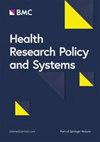Development and pilot implementation of a novel protocol to assess capacity and readiness of health systems to adopt HPV detection-based cervical cancer screening in Europe
IF 3.6
2区 医学
Q1 HEALTH POLICY & SERVICES
引用次数: 0
Abstract
Cervical cancer remains a significant public health concern in Europe. Effective introduction and scaling up of human papillomavirus (HPV) detection-based cervical cancer screening (CCS) requires a systematic assessment of health systems capacity. However, there is no validated capacity assessment methodology for CCS programmes, especially in European contexts. Addressing this gap, our study introduces an innovative and adaptable protocol for evaluating the capacity of CCS programmes across varying European health system settings. Our research team developed a three-step capacity assessment framework, incorporating a health policy review checklist, a facility visit survey, and key informants’ interview guide followed by a strengths, weaknesses, opportunities and threats (SWOT) analysis. Piloting this comprehensive approach, we explored the CCS capacity in three countries: Estonia, Portugal and Romania. These countries were selected due to their contrasting healthcare structures and resources, providing a diverse overview of the European context. Conducted over a period of 9 months, the capacity assessment covered multiple resources, 27 screening centres, 16 colposcopy and treatment centres and 15 key informant interviews. Our analysis highlighted both shared and country-specific challenges. A key common issue was ensuring high compliance to follow-up and management of screen-positive women. We identified considerable heterogeneity in resources and organization across the three countries, underscoring the need for tailored, rather than one-size-fits-all, solutions. Our study’s novelty lies in the successful development of this capacity assessment methodology implementable within a relatively short time frame, proving its feasibility for use in various contexts and countries. The resulting set of materials, adaptable to different cancer types, is a ready-to-use toolkit to improve cancer screening processes and outcomes. This research marks a significant stride towards comprehensive capacity assessment for CCS programmes in Europe. Future directions include deploying these tools in other countries and cancer types, thereby contributing to the global fight against cancer.制定并试点实施一项新协议,以评估欧洲卫生系统采用基于 HPV 检测的宫颈癌筛查的能力和准备情况
在欧洲,宫颈癌仍然是一个重大的公共卫生问题。要有效引入和扩大以人类乳头瘤病毒(HPV)检测为基础的宫颈癌筛查(CCS),就必须对卫生系统的能力进行系统评估。然而,目前还没有针对宫颈癌筛查计划的有效能力评估方法,尤其是在欧洲。为了弥补这一不足,我们的研究引入了一种创新的、可调整的方案,用于评估不同欧洲卫生系统环境下的宫颈癌筛查项目能力。我们的研究团队开发了一个三步能力评估框架,其中包括卫生政策审查清单、设施访问调查和关键信息提供者访谈指南,以及优势、劣势、机会和威胁(SWOT)分析。我们在三个国家试行了这一综合方法,探索了中央案例研究的能力:爱沙尼亚、葡萄牙和罗马尼亚。之所以选择这三个国家,是因为它们的医疗保健结构和资源各不相同,能够提供欧洲背景下的不同概况。能力评估历时 9 个月,涵盖了多种资源、27 个筛查中心、16 个阴道镜检查和治疗中心以及 15 次关键信息提供者访谈。我们的分析强调了共同的挑战和各国特有的挑战。一个关键的共同问题是确保筛查呈阳性的妇女高度遵守随访和管理规定。我们发现这三个国家在资源和组织方面存在相当大的差异,这突出表明需要量身定制而非一刀切的解决方案。我们这项研究的新颖之处在于成功地开发了这种可在较短时间内实施的能力评估方法,证明了其在不同环境和国家使用的可行性。由此产生的一套材料可适用于不同的癌症类型,是一套可随时使用的工具包,用于改善癌症筛查流程和结果。这项研究标志着欧洲在综合能力评估癌症分类计划方面迈出了重要一步。未来的方向包括在其他国家和癌症类型中部署这些工具,从而为全球抗击癌症做出贡献。
本文章由计算机程序翻译,如有差异,请以英文原文为准。
求助全文
约1分钟内获得全文
求助全文
来源期刊

Health Research Policy and Systems
HEALTH POLICY & SERVICES-
CiteScore
7.50
自引率
7.50%
发文量
124
审稿时长
27 weeks
期刊介绍:
Health Research Policy and Systems is an Open Access, peer-reviewed, online journal that aims to provide a platform for the global research community to share their views, findings, insights and successes. Health Research Policy and Systems considers manuscripts that investigate the role of evidence-based health policy and health research systems in ensuring the efficient utilization and application of knowledge to improve health and health equity, especially in developing countries. Research is the foundation for improvements in public health. The problem is that people involved in different areas of research, together with managers and administrators in charge of research entities, do not communicate sufficiently with each other.
 求助内容:
求助内容: 应助结果提醒方式:
应助结果提醒方式:


